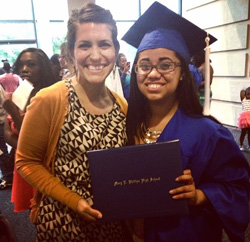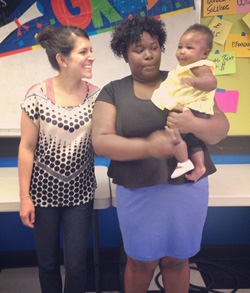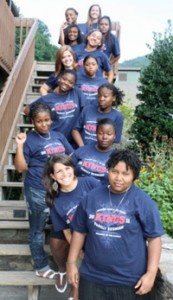An eighth grade social studies and English/language arts teacher at Carroll Middle School in Raleigh, N.C., Jessie Jordan Hathcock ’11 is carrying on a family legacy in education. Her mother, who lost her battle with breast cancer when Hathcock was four years old, was a public school teacher. Hathcock grew up hearing stories of her mother’s positive impact on their community, and decided to major in middle grades education at NC State. She recently completed her fourth year of teaching.
“I chose middle school,” she said, “because in under-resourced communities, children are exposed to risk factors at an incredibly young age. Waiting until high school to ‘make a difference’ is sometimes too late.”
Hathcock’s desire to work with underserved students stems, in part, from her own brush with situational poverty. Her widowed father lost his job during Hathcock’s high school years, resulting in a period of financial hardship for their formerly middle-class family.
“I realized during college there is a huge difference between children who experience situational versus generational poverty,” Hathcock said. “It was hard enough for our family, and we had a strong social network. I became very interested in learning about the specific difficulties of children who grow up in poverty. The statistics are not pretty.”
During her undergraduate career, Hathcock observed many of these challenges firsthand while serving as an Urban Young Life leader for middle school girls through Raleigh’s Neighbor to Neighbor Outreach. Her coursework complemented these observations, exposing her to topics ranging from African American history to the achievement gap in education.
“This gap infuriated me,” she said. “Education is supposed to be the great equalizer, yet our schools are constantly failing children in poverty – which overwhelmingly affects minority students.”
With this in mind, Hathcock developed her final senior project around the question of how to end generational poverty. She researched many nonprofit organizations throughout the U.S. that were effecting significant change in their communities.
“The one that stood out the most,” she said, “was Harlem Children’s Zone (HCZ), which created a pipeline of services for 120 blocks in Harlem, N.Y. The most intriguing part about HCZ was its outreach to pregnant parents and parents with children under the age of five to get plugged into their ‘Baby College.’”
The notion of educating expectant and new parents about child development in order to help them raise thriving children resonated with Hathcock.
“The first five years of a child’s life often shape the trajectory of their future,” she said. “To me, it just made sense. If I really wanted to be a part of ending generational poverty, I needed to create something similar in Raleigh.”
Now, Hathcock is doing just that. This fall, she and a friend – a kindergarten teacher with eight years of experience – will launch a program called First Five, intended to help new parents set the stage for their children’s kindergarten readiness.
“As teachers, we firmly believe that education is the single most important factor to end generational poverty,” said Hathcock. “We also believe that parents should become their child’s first teacher and advocate for a successful future. We are hoping that First Five can become an integral part of breaking the cycle of generational poverty in Wake County and help close the achievement gap in our schools.”
Hathcock and her First Five collaborator, Emily Dawson, will pilot the program this coming academic year at Raleigh’s Mary Phillips High School. They will meet twice weekly after school with 15-20 teen mothers, delivering a research-driven curriculum that addresses subjects related to job training, financial literacy, and early childhood development.
First Five is designed to be scalable, and Hathcock hopes to secure investors who share her vision in order to expand the program to high schools across Wake County.
“Teen mothers will always benefit from resources and tools that will build their confidence as learners and mothers, as well as provide a support system that counsels through difficulties,” she said. “In addition, the children of these mothers deserve to be exposed to kindergarten readiness and positive parenting.”
Hathcock and Dawson recently received their first grant from Wake Education Partnership, and are hosting First Five’s inaugural Kindergarten Camp this summer.
Hathcock credits her Park Scholarships experience with laying some of the groundwork for her current endeavors.
“I loved the Leadership Academy,” she said. “It helped shape my understanding of what it means to be a leader and the many styles of leadership.”
Hathcock also acknowledged, “Without the Park Scholarship, I would have had to get several jobs to help pay for college. Instead, I was able to pursue my passion of working with children in poverty.”
Interested in supporting the First Five initiative? Hathcock and Dawson welcome your contributions.
posted 2015.06.18


